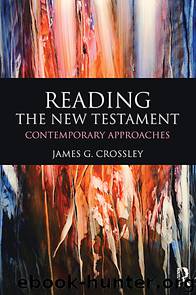Reading the New Testament by James G. Crossley

Author:James G. Crossley
Language: eng
Format: epub
Tags: Humanities
Publisher: Taylor and Francis
Published: 2010-06-10T16:00:00+00:00
The point I am trying to introduce in this chapter is that we might be able to provide different explanations for the origins of non-observance in Christianity which would eventually become one of the ways Christians could define themselves in differentiation from Judaism.
There is inevitably a degree of speculation about the specifics of such a broad explanation but the general idea that more and more Gentiles would have led to a profound questioning of the role of the Law in earliest Christianity is clear enough. Then the question arises: what is to be done with all these people? One of the first major attempts to deal with this issue was the council at Jerusalem, around 50 CE (Acts 15; Gal. 2.1–10). According to Acts 15, the sheer number of Gentiles is seen as a blessing and the solution is written in a letter ‘that you abstain from what has been sacrificed to idols and from blood and from what is strangled and from fornication’ (Acts 15.29; cf. v. 20). In what looks to be a parallel retelling in Galatians 2.1–10, there is no mention of this letter, though it is possible that Paul did not think even these things ought to be imposed on Gentiles. According to Paul’s account, there is little to be imposed it would seem (Gal. 2.1–10). In the long run, the most influential attempt to deal with the issue of Gentiles and the Law was, as we saw, Paul’s letters and his idea of justification by faith without works of the Law. Paul’s attempted solution was so influential that today even the world’s most famous atheist thinkers still see him as a figure to be ‘rescued’ in that his thought and theology are now very much part of both a mainstream and radical intellectual tradition. It is to this we now turn.
Download
This site does not store any files on its server. We only index and link to content provided by other sites. Please contact the content providers to delete copyright contents if any and email us, we'll remove relevant links or contents immediately.
The Gnostic Gospels by Pagels Elaine(2531)
Jesus by Paul Johnson(2363)
Devil, The by Almond Philip C(2333)
The Nativity by Geza Vermes(2233)
The Psychedelic Gospels: The Secret History of Hallucinogens in Christianity by Jerry B. Brown(2158)
Forensics by Val McDermid(2094)
Going Clear: Scientology, Hollywood, and the Prison of Belief by Lawrence Wright(1985)
Going Clear by Lawrence Wright(1968)
Barking to the Choir by Gregory Boyle(1822)
Old Testament History by John H. Sailhamer(1817)
Augustine: Conversions to Confessions by Robin Lane Fox(1774)
The Early Centuries - Byzantium 01 by John Julius Norwich(1745)
A History of the Franks by Gregory of Tours(1729)
A Prophet with Honor by William C. Martin(1727)
Dark Mysteries of the Vatican by H. Paul Jeffers(1723)
The Bible Doesn't Say That by Dr. Joel M. Hoffman(1682)
by Christianity & Islam(1636)
The First Crusade by Thomas Asbridge(1610)
The Amish by Steven M. Nolt(1575)
